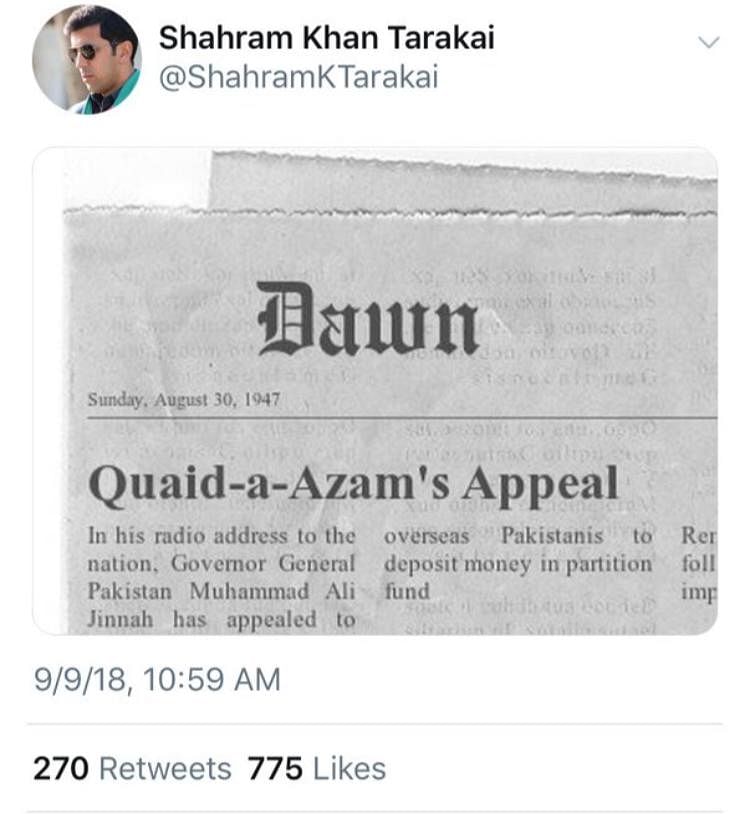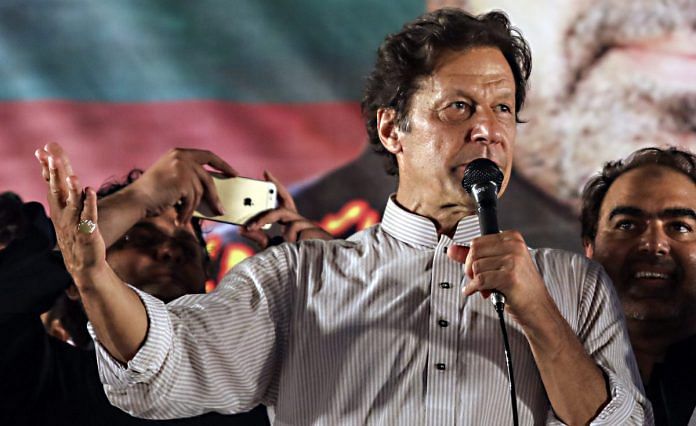Atif Mian’s sacking by Imran Khan’s PTI govt will not escape the notice of the EU or other Western trading partners.
One of the most shocking aspects of the sacking of Princeton professor and economist Atif R. Mian from Pakistan’s Economic Advisory Council is that Prime Minister Imran Khan’s government has clearly violated the fundamental rights guaranteed to all citizens in the nation’s constitution. And, it may also trigger negative international ramifications.
Article 27(1) of the Pakistani constitution assures “safeguard against discrimination in services… on the ground only of race, religion, caste…”
Besides the illegality of the move to sack Atif Mian for his Ahmedi identity, it was a high-profile blunder that is likely to have far-reaching global consequences for Pakistan. Especially because former Prime Minister Nawaz Sharif had, after all, made a commitment to the European Union to undo the historic discrimination against Ahmedis in Pakistan in return for trade concessions.
During Sharif’s government, parliament had unanimously enacted the Elections Act 2017, which scrapped the entire Conduct of General Elections Order 2002 inserted by former dictator General Pervez Musharraf. The new Act had potentially enabled Ahmedis to vote on the joint electorate rolls, without declaring themselves as non-Muslims. This would have served to end their disenfranchisement from the electoral process. The Ahmedia community has historically refused to vote under these conditions as they identify themselves as Muslims.
Also read: Imran Khan shows his cowardice by dropping Princeton prof Atif Mian over Ahmedia identity
However, Imran Khan with the help of Islamist elements had run a relentless campaign of Khatm-e-Nabuat against Sharif and the amendment was reversed putting the Ahmedias back in the dock.
The sacking of Mian by Khan’s PTI government will not have escaped the eyes of the EU or other Western trading partners. If Sharif’s government was seen as well-meaning but helpless in its attempt at bettering the country’s human rights record, Khan’s will be seen as positively bigoted and incognisant of the financial and economic risks these sort of moves pose in a global era.
Disastrously, Mian’s removal was quickly followed by the protest resignations from the Council of the two remaining economists of international repute — Dr Asim Ijaz Khwaja (professor of international finance and development at the Harvard Kennedy School) and Imran Rasul, (professor of economics at the University College, London).
“They drove @AtifRMian off their economic advisory council?! Are they nuts?” tweeted Austan Goolsbee, an economics professor at University of Chicago’s Booth School of Business. He is also a former Chairman of the Council of Economic Advisers. Many others joined him in condemnation.
Other consequences of this sacking become ironically apparent by one of Mian’s own policy recommendations in a piece he wrote before he was engaged, “One of the government’s first orders of business should be to do everything it can to attract this top talent into Pakistan. This requires changing Pakistan’s narrative and promoting a pluralistic society. Today’s much sought-after global talent increasingly demands an open and free society.” The protest resignations of Khwaja and Rasul have already demonstrated that Pakistan is on the reverse path to attracting talent back into a country.
Also read: Insulting removal of Princeton prof shows Pakistan has forgotten Jinnah’s view on Ahmedis
Right on the heels of these resignations came Khan’s appeal to expatriate Pakistanis to donate for a dam fund announced earlier by the Chief Justice of Pakistan. “I am still stunned that on a day we’re all busy absorbing the news of what has happened on the EAC, Imran Khan decides to deliver a public appeal asking overseas Pakistanis to donate to the dam fund,” tweeted Khurram Husain, the highly respected business editor at Dawn newspaper. Twitter went up in a blaze with dam poetry and memes such as ‘bheekonomics’ (economics of begging) and ‘faqir-e-azam’ (beggar-in-chief).
Journalist Murtaza Solangi pointed out the foolish and unviable nature of the appeal given the share of expats in the Rs 1.93 billion collected so far in two months is only 1 per cent, with the rest of the money having been raised from resident Pakistanis via forced salary cuts, and extortion of errant members of the assemblies by the Chief Justice, and some high profile donations by those seeking to curry favour with the powers that be.
The other farcical aspect is, assuming the current rate of fund donations hold, it would require 120 years to gather the total required sum of Rs 1.45 trillion. Khan’s appeal coming in the wake of the exit of three economists rang ominous.
To compound the horror, fears of “launching crackpot schemes and wild goose chases under the garb of economic policy” according to Husain, started to come true. The task force promised by the finance minister to bring back ‘looted $200 million’ stashed in foreign accounts became a reality, and the chase began Saturday – notwithstanding the fact that neither is there any evidence such an amount in ‘looted’ wealth exists, nor a penny has ever been recovered from anyone’s offshore accounts. The tragi-comic provenance of the imagined number was investigated and debunked by Husain long ago.
However, in its very first meeting, the task force was obliged to revise the targeted figure down to $0.8 billion, a mere 0.4 per cent of the electoral campaign promises.
Next, Imran Khan chaired the first Economic Advisory Council meeting and pondered on out-of-the-box solutions for Pakistan’s current account deficit, and a wide import-export gap, and discussed bans on imports of cheese, smartphones and luxury cars. “You see how much cheese is coming in this country from abroad,” said Ashfaq Hasan Khan, a university professor, one of the remaining members of the EAC. “Market is full of imported cheese. Does this country, which doesn’t have dollars, deserve this, that it is importing cheese?”
Also read: 2 quit PM’s panel to protest firing of Ahmadi economist by Imran Khan govt
The public is directly co-relating mind-numbingly dumb discussions reported at the EAC with the exit of brilliant economists. The deep worry and trepidation is cloaked in mirth, as usual, having resulted in Twitter hashtags like #CheeseGate and memes like ‘Imran Khan will Make Pakistan Grate Again’ – first tweeted by Reuters correspondent Drazen Jorgic.
In an effort to normalise the chicanery that is passing off for economic policy of the government, PTI minister Shahram Tarakai tweeted a fake, generated news image of Dawn newspaper asserting that the first governor general of Pakistan, Muhammad Ali Jinnah appealed to overseas Pakistanis to deposit money in the ‘Partition fund’ – on Sunday, 30 August 1947, fourteen days after Partition.

There is no light at the end of this tunnel — yet. And the entire world, including the IMF, is watching.
The author is a columnist and human rights defender based in Lahore.




@MuhammadHasnain…everything you have stated is a lie..Your statements can easily be fact checked by going to alislam.org and reading the Ahmadi beliefs directly from their own website. In short, Ahmadi Muslims do not believe the founder of the community to be God. They believe him to be the Imam Mahdi and Maessiah promised by The Holy Prophet (saw). Ahmadis do not consider non-Ahmadis to be non-Muslim – no one has a right to declare another a non-Muslim after they read the Kalima. And lastly, Pakistan as a whole is not an extremist country BUT does have an influential extremist group of Mullahs who are narrow minded, bigoted and frankly do not represent the values of true Islam. The Holy Prophet (saw) would not approve of what happened to Atif Mian or the discrimination minorities face in Pakistan.
Pakistan is not a extremist country the Ahmadis claim to be muslims but they had a completely different faith which is not Islamic rather anti Islam. They claim other muslims as non-muslims which is most controversial belief of Ahmadis besides this extremist belief Mirza Ghulam Ahmad Qadiyani(founder of Ahmadiyya) claims he is god.